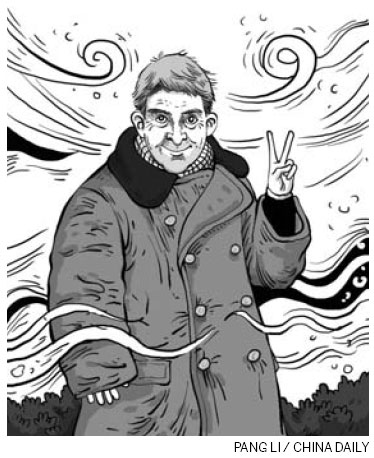I have never been colder than here in Beijing. A perishing cold that creeps across your back and chills your arms and legs.
Of course it was my own fault. When we left the United Kingdom in the middle of August, the last thing on my mind was to pack my winter coat. Then as November arrived and the mercury plunged I found that my raincoat was inadequate.
Being a Scotsman I was reluctant to shell out a load of money for another winter coat. And in any case I had seen exactly what I needed: an olive green, army greatcoat as worn by street hawkers and hot chestnut vendors.
I imagined I might cut a dash back in Glasgow in a People's Liberation Army greatcoat.

Where to find a coat like that? I kept my eyes peeled at various markets and street stalls but to no avail.
Meanwhile, I invested in a set of cotton long johns and long-sleeved vest. I was told the trick to keeping warm in Beijing is to wear layers.
I bought a ski mask which covered my neck and much of my face. Bliss. But a trip to Houhai for evening ice skating (which was cancelled) left me chilled to the marrow. Layers of clothing under a thin anorak were simply not enough.
I needed a coat, pronto. A friend suggested a supermarket. But all I could see there was what used to be called car coats, which were mid-thigh length. I wanted to be enveloped in duck down, or at least cotton flannel.
A Google search revealed the location of Beijing's only official PLA army surplus store. A Chinese friend gave me the directions. At last I would have a greatcoat and maybe even a furry hat. Only problem was Spring Festival holidays disrupted my salary payment. I had no money to spend on a coat, far less anything else.
Then one day I came back to our block of flats and noticed a pile of cast-offs beside the bins. There's a transient population in our block. Expats come and go. And when they leave, they pass on their bric-a-brac. We've furnished our apartment with hand-me-downs.

Our Chinese neighbors often dump stuff they don't need beside the garbage bins, so anyone can poke around to find anything worth salvaging.
Someone was obviously having a big clear out: there were several pairs of jeans, numerous shirts, T-shirts, a padded jacket and an olive drab greatcoat.
An American friend said: "John, that's your coat."
I picked it up and gave it a shake. It was crushed, but in reasonable condition. I pedaled to the drycleaner's with my find.
Three days later when I returned to collect it, my coat had grown plumper. The dry-cleaning woman could hardly get it into a plastic bag, it was so bulky.
The brass buttons gleamed, the brown fake fur collar was soft and luxurious to the touch. I tried my greatcoat on in the privacy of our bedroom. It was like putting on a horse blanket. It hung well below the knees and buttoned up to the neck. I could feel the thick padding under my arms. Best of all, it was a perfect fit.
Now I have heard of cargo cults, where primitive people in isolated societies obtain material goods from an advanced culture.
Cult members believe that the goods or cargo were intended for them by their gods and ancestors.
Cargo cults flourished in the Pacific region during and after WWII when islanders saw American and Japanese soldiers bringing in large amounts of supplies.
When the war ended the flow of goods ceased. In an attempt to attract further deliveries of goods, islanders engaged in ritualistic practices, such as building crude imitation landing strips, aircraft and radio gear and mimicking the behavior of the soldiers who had used them.
I have set up my bivouac near the rubbish bins. I do a bit of square-bashing to keep warm. It's only a matter of time until my army fur hat arrives.?
|
|
|
|
|
|
|
|
